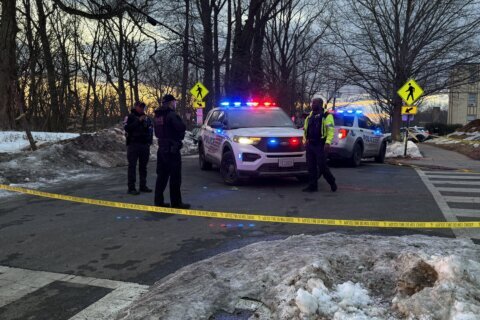The top prosecutor in D.C. says the continued fallout from the District’s shuttered crime lab means his office has been unable to bring charges against suspected offenders in some cases.
Overall, prosecutors with the U.S. Attorney’s Office — the arm of the federal Justice Department tasked with prosecuting local D.C. felonies — declined to bring charges in more than two-thirds of arrests made by D.C. police in 2022, according to data first reported earlier this year by the DC Crime Facts substack.
Speaking Wednesday during a “crime summit” hosted by D.C. officials, U.S. Attorney for D.C. Matthew Graves said most of the cases his office declined — or “no-papered” — were misdemeanors. And many of them involved drugs that could not be tested since the D.C. Department of Forensic Sciences lost its accreditation to perform forensic testing more than two years ago.
“We, of course, have not been able to test drugs since DFS lost its accreditation … If we cannot prove beyond a reasonable doubt that the suspected substance is a drug, then we can’t prosecute,” Graves said. “That’s been a big part of the story.”
DFS had its accreditation withdrawn in April 2021 amid a probe by the U.S. Attorney’s Office into errors in the lab’s Firearms Examination Unit and allegations of mismanagement by top lab leadership.
Last year, prosecutors said the federal Drug Enforcement Administration had agreed to perform drug testing for local D.C. cases under a one-year agreement. On Wednesday, Graves said the mayor’s office had also recently identified a new vendor that could start testing drugs but did not provide any other details.
Drug testing is not the only area where forensic testing resources are strained.
Since losing its accreditation, DFS has been sending DNA evidence to multiple private labs for testing, but backlogs are piling up.
While there is no current backlog for testing sexual assault kits, the agency’s Forensic Biology Unit, which handles DNA testing, “is suffering a backlog of 770 samples in violent crime cases, which is due to the loss of accreditation,” according to information from a draft budget proposal from the D.C. Council’s Public Safety and Judiciary Committee.
D.C. Mayor Muriel Bowser, who has long insisted prosecutors share blame for the lab’s dysfunction, suggested the U.S. attorney’s office could use the “vast resources of the federal government” if it needs more testing capacity.
“It will be unacceptable to us to say that we don’t have this when we know what the Justice Department can do when it wants to do something,” she told reporters Wednesday.
Abrupt leadership change
Bowser’s crime summit came less than a week after the former temporary head of the forensic lab abruptly stepped down. Bowser’s office sent a news release Friday saying Dr. Francisco Diaz, who currently serves as the District’s chief medical examiner, would serve double-duty as the interim director of DFS.
Bower’s office has not responded to multiple requests for more information about the apparent departure of former interim chief Anthony Crispino.
Dr. Jeanne Jordan, a professor of epidemiology at The George Washington University, who serves as the chair of the agency’s Science Advisory Board, said the board was never notified of the move by the mayor’s office and that she only found out about it days later from a news article.
The leadership shuffle comes as officials are preparing to apply for reaccreditation for the lab’s DNA and chemistry units, the first step in what is expected to be a monthslong process that would eventually allow the agency to once again test DNA evidence and seized drugs.
Brandy Cramer, the DFS chief of staff, gave a brief presentation during Wednesday’s crime summit, highlighting the steps the agency is undertaking to restore normal operations.
Last year, the agency retained an outside consultant to help guide the agency through accreditation.
“The consultants met with us and just came up with a plan on how we should tackle this because it’s a really big job,” she said. “So that’s where we came up with the phased approach.”
For now, DNA analysts and chemists are working on “mock casework” to demonstrate their capabilities. The plan to begin the application process for reaccreditation in June remains on track, Cramer said.
‘Won’t make the city safer’
Separately, Bowser and D.C. City Administrator Kevin Donohue are urging D.C. Council members to reverse course on a DFS overhaul bill the council passed unanimously six months ago.
The Restoring Trust and Credibility to Forensic Sciences Act, which has not yet been enacted, restructures DFS as an independent agency — removing it from the direct control of the mayor — and strengthens the Science Advisory Board.
The measure was championed by D.C. Council member Charles Allen, the former chair of the council’s Public Safety and Judiciary Committee, and supported by the Office of the Attorney General, then led by Karl Racine.
Testifying before the council last summer, Jose Marrero, an official in Racine’s office, said long-standing problems at the lab “were allowed to fester and compound for years” under mayoral control and that, “It is imperative that the laboratory’s new director be able to assess and report on what they find in the laboratory and what will be required to fix it with candor.”
On Wednesday, Bowser called on the council to reverse Allen’s bill, which she claimed, “won’t make the city safer and won’t allow us to build a better DFS.”
The council is set to give a first vote to the mayor’s proposed budget on May 16.
Donohue suggested making DFS independent of the mayor’s office would make it difficult to recruit a permanent director.
Donohue said he’s involved in efforts to recruit a permanent director for the agency and that when he interviews candidates, he said they expect to report to the mayor.
“The expectation of every qualified person that I’ve talked to — and I’ve talked to every qualified candidate who has expressed interest — is they would like the agency to have a chain of command that reflects what they see everywhere else in the country.”
Some well-regarded crime labs, however, do not have a director that reports directly to a mayor or governor.
The Houston Forensic Science Center — which was also beset by scandal more than a decade ago and is now lauded as a success story — has a director who reports to a nine-member board of directors. The members of the board are appointed by the city’s mayor and confirmed by the city council.
D.C. listed the job posting for the permanent director position in March of this year. The director must have prior forensic science experience, an advanced degree in an applicable area of science, and a minimum of five years of management-level experience, among other qualifications.
The annual salary range is $274,831 to $357,281.
The job posting contains a list of several “duties and responsibilities” of the director. The first item listed says the new director is to serve as a “consultant and adviser to the Mayor on matters affecting the District of Columbia’s forensic science services.”
The 10th item, in a list of 15, is that the director “ensures a high level of quality and integrity in the forensic science services” and maintains accreditation.
Applicants are also asked to describe “why you’re interested in being appointed by Mayor Bowser to a role in the Administration,” and if selected, “how you will use it to help lead DC’s comeback.”








